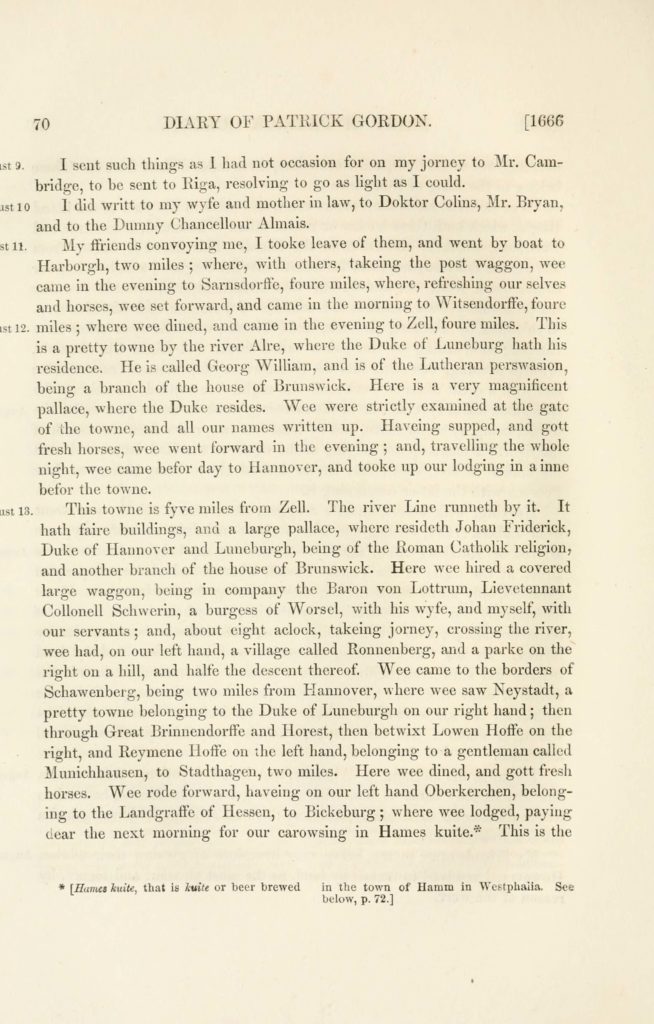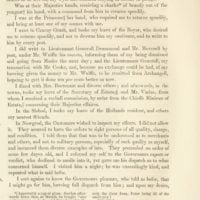
Related
![1666] DIARY OF PATRICK GORDON. 79 I did writt to Sir John Hebden](https://cdn2.picryl.com/thumbnail/1699/12/31/1666-diary-of-patrick-gordon-79-i-did-writt-to-sir-john-hebden-64f584-200.jpeg)
1666] DIARY OF PATRICK GORDON. 79 I did writt to Sir John Hebden

58 DIARY OF PATRICK GORDON. [1666 letter not haveing any character

66 DIARY OF PATRICK GORDON. [1666 wee had from Plesko
![1666] DIARY OF PATEICK GORDON. 81 mariners aud souldlers](https://cdn2.picryl.com/thumbnail/1699/12/31/1666-diary-of-pateick-gordon-81-mariners-aud-souldlers-ea9fb7-200.jpeg)
1666] DIARY OF PATEICK GORDON. 81 mariners aud souldlers

110 DIARY OF PATRICK GORDON. [1686 I gave up my petition
![1667] DIARY OF PATRICK GORDON. 97 storme, wee could not gett over to Embden](https://cdn2.picryl.com/thumbnail/1699/12/31/1667-diary-of-patrick-gordon-97-storme-wee-could-not-gett-over-to-embden-4fd79e-200.jpeg)
1667] DIARY OF PATRICK GORDON. 97 storme, wee could not gett over to Embden

172 DIARY OF PATRICK GORDON. [1690 his name was not in it, it being sent to him to be dehvered pubhkely
![1666] DIARY OF PATRICK GORDON. 6S Here wee gott horses and waggons](https://cdn2.picryl.com/thumbnail/1699/12/31/1666-diary-of-patrick-gordon-6s-here-wee-gott-horses-and-waggons-f89821-200.jpeg)
1666] DIARY OF PATRICK GORDON. 6S Here wee gott horses and waggons
![1666] DIARY OF PATRICK GORDON. 63 ing the river, 1 passed by them without noise](https://cdn2.picryl.com/thumbnail/1699/12/31/1666-diary-of-patrick-gordon-63-ing-the-river-1-passed-by-them-without-noise-bdf220-200.jpeg)
1666] DIARY OF PATRICK GORDON. 63 ing the river, 1 passed by them without noise
70 DIARY OF PATKICK GORDON. [1666 ist 9. I sent such things as 1 had not occasion for on my jorney
Summary
Passages from the diary of General Patrick Gordon of Auchleuchries : A.D. 1635-A.D. 1699"
70 DIARY OF PATKICK GORDON. [1666
ist 9. I sent such things as 1 had not occasion for on my jorney to Mr. Cam-
bridge, to be sent to Riga, resolving to go as light as I could,
astio 1 did writt to my wyfe and mother in law, to Doktor Colius, I\Ir. Bryan,
and to the Dumny Chancellour Almais.
St 11. My fFrieuds convoying me, I tooke leave of them, and went by boat to
Harborgh, two miles ; where, with others, takeing the post waggon, wee
came in the evening to Sarnsdorffe, foure miles, where, refreshing our selves
and horses, wee set forward, and came in the morning to Witsendorffe, foure
ist 12. miles ; where wee dined, and came in the evening to Zell, foure miles. This
is a pretty towne by the river Aire, where the Duke of Luneburg hath his
residence. He is called Georg William, and is of the Lutheran perswasion,
being a branch of the house of Brunswick. Here is a very magnificent
pallace, where the Duke resides. Wee were strictly examined at the gate
of the towne, and all our names written up. Haveing supped, and gott
fresh horses, wee went forward in the evening ; and, travelling the whole
night, wee came befor day to Hannover, and tooke up our lodging in a inne
befor the towne.
list 13. This towne is fyve miles from Zell. The river Line runneth by it. It
hath faire buildings, and a large pallace, where residcth Johan Friderick,
Duke of Hannover and Luneburgh, being of the Roman Catholik rehgion,
and another branch of the house of Brunswick. Here wee hired a covered
large waggon, being in company the Baron von Lottrum, Lievetennant
Collonell Schwerin, a burgess of Worsel, with his wyfe, and myself, with
our servants ; and, about eight aclock, takeing jorney, crossing the river,
wee had, on our left hand, a village called Ronnenberg, and a parke on the
right on a hill, and halfe the descent thereof. Wee came to the borders of
Schawenberg, being two miles from Hannover, where wee saw Neystadt, a
pretty towne belonging to the Duke of Luneburgh on our right hand ; then
through Great Brinnendorffe and Horest, then betwixt Lowen Hoffe on the
right, and Reymene Hoffe on the left hand, belonging to a gentleman called
Munichhausen, to Stadthagen, two miles. Here wee dined, and gott fresh
horses. Wee rode forward, haveing on our left hand Oberkerchen, belong-
ing to the Landgraffe of Hessen, to Bickeburg ; where wee lodged, paying
dear the next morning for our carowsing in Hames kuite.* This is the
* [Humes hate, that is luite or beer brewed in the town of Hamm in Westphalia. See
below, p. 72.]
Gordon was brought up and remained a lifelong Roman Catholic, at a time when the Church was being persecuted in Scotland. At age of fifteen, he entered the Jesuit college at Braunsberg, East Prussia, then part of Poland. In 1661, after many years experiences as a soldier of fortune, he joined the Russian army under Tsar Aleksei I, and in 1665 was sent on a special mission to England. After his return, he distinguished himself in several wars against the Turks and Tatars in southern Russia. In recognition of his service he was promoted to major-general in 1678, was appointed to the high command at Kiev in 1679, and in 1683 was made lieutenant-general. In 1687 and 1689 he took part in expeditions against the Tatars in the Crimea, being made a full general. Later in 1689, a revolution broke out in Moscow, and with the troops under his command, Gordon virtually decided events in favor of Peter the Great against the Regent, Tsarevna Sophia Alekseyevna. Consequently, he was for the remainder of his life in high favor with the Tsar, who confided to him the command of his capital during his absence from Russia. In 1696, Gordon's design of a "moveable rampart" played a key role in helping the Russians take Azov. One of Gordon's convinced the Tsars to establish the first Roman Catholic church and school in Muscovy, of which he remained the main benefactor and headed the Catholic community in Russia until his death. For his services his second son James, brigadier of the Russian army, was created Count of the Holy Roman Empire in 1701. At the end of his life the Tsar, who had visited Gordon frequently during his illness, was with him when he died, and with his own hands closed his eyes. General Gordon left behind him a uniquely detailed diary of his life and times, written in English. This is preserved in manuscript in the Russian State Military Archive in Moscow. Passages from the Diary of General Patrick Gordon of Auchleuchries (1635–1699) was printed, under the editorship of Joseph Robertson, for the Spalding Club, at Aberdeen, Scotland, 1859.
